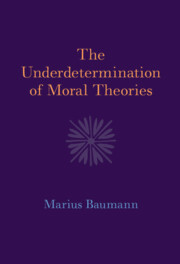Book contents
- Frontmatter
- Dedication
- Contents
- Acknowledgments
- Introduction
- Part I Scientific Underdetermination and the Analogy to Ethics
- Chapter 1 Underdetermination in Science
- Chapter 2 The Analogy to the Moral Realm
- Part II Underdetermination in Normative Ethics
- Part III Skepticism and a New Metaethical Position
- Bibliography
- Index
Chapter 1 - Underdetermination in Science
from Part I - Scientific Underdetermination and the Analogy to Ethics
Published online by Cambridge University Press: 14 March 2025
- Frontmatter
- Dedication
- Contents
- Acknowledgments
- Introduction
- Part I Scientific Underdetermination and the Analogy to Ethics
- Chapter 1 Underdetermination in Science
- Chapter 2 The Analogy to the Moral Realm
- Part II Underdetermination in Normative Ethics
- Part III Skepticism and a New Metaethical Position
- Bibliography
- Index
Summary
Chapter 1 provides the background in the philosophy of science. The goal is twofold. First, I aim to provide the reader with a firm grasp of the general idea of scientific underdetermination. For this purpose, I start with some examples to illustrate the phenomenon, ranging from everyday situations to physics to other domains of science. Then, I introduce the two main progenitors of the idea, Pierre Duhem and W. V. O. Quine. Second, I provide a more systematic overview of two issues that inform the later discussion in ethics. On the one hand, I introduce the main argumentative strategies that have been employed to argue for underdetermination in science, i.e., the inductive, the holistic, and the algorithmic strategies. On the other hand, I make a number of distinctions between different versions of underdetermination to provide a picture of the various forms that underdetermination can take. These distinctions are: existence vs. non-uniqueness vs. egalitarian, local vs. global, permanent vs. transient vs. recurrent, and deductive vs. ampliative.
Keywords
- Type
- Chapter
- Information
- The Underdetermination of Moral Theories , pp. 13 - 34Publisher: Cambridge University PressPrint publication year: 2025
- Creative Commons
- This content is Open Access and distributed under the terms of the Creative Commons Attribution licence CC-BY-NC-ND 4.0 https://creativecommons.org/cclicenses/

